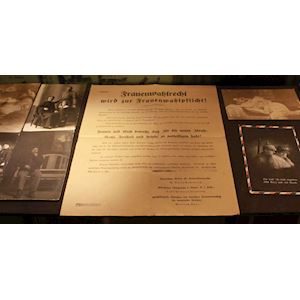
08 Women in the War
While hundreds of thousands of men are at the front, just as many women are left behind at home. The First World War is also a very determining time for them. While their men are absent, the women take up important roles: working the land, working in factories or working as train guards. Or they help out as nurses in the many hospitals or end up in the less fortunate role of prostitute. The syringe in the wall cabinet is used to treat an unpleasant side-effect of prostitution: gonorrhoea. In Germany, the First World War leads to women getting the right to vote after the war. The pamphlet in the cabinet that calls for “Frauenwahlrecht” (votes for women) is a nice illustration of that. Women kept the country on its feet during the war and in Germany, they have the right to vote from now on. In Belgium, it will take many years before that happens, until after the Second World War.


Memorial Museum Passchendaele 1917
Discover what our museum has to offer by listening to or by reading the audio stops below. Do you have a warm heart for the Memorial Museum Passchendaele 1917, or do you want to support us in these difficult times? Become a member of the ‘Passchendaele society’ via passchendaele.be and commemorate the Battle of Passchendaele and its more than 600,000 casualties.
- Berten Pilstraat 5A
- Zonnebeke Belgium
- 0032 (0)51 77 04 41
- www.passchendaele.be
